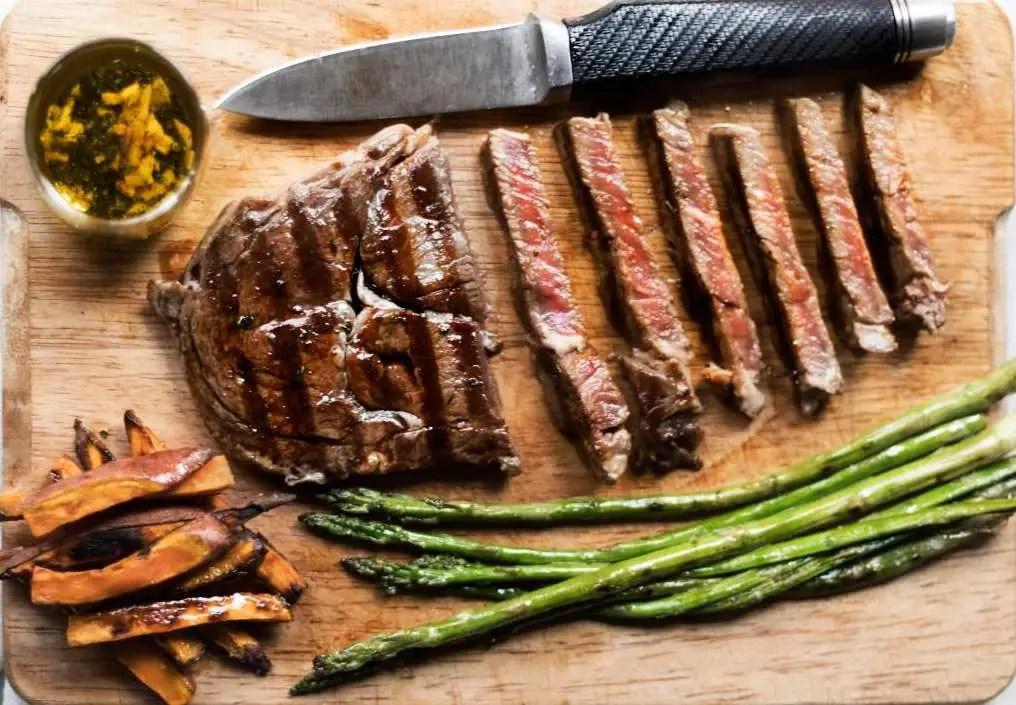Less carbs, more protein.
That’s it! End of article.
But really, let’s dig into that a little more. Very generally speaking, we can say that calories in and calories out control our body weight. Meaning the literal weight when we stand on a scale will be affected primarily by how many calories we eat and how many calories we burn.
My assertion would be that when most people say they “want to lose weight,” they’re actually missing the mark. I would argue that what most people actually want is to lean out. They want less body fat and typically to maintain the same amount of muscle or continue to build it.
Meaning we’re talking about changing body composition not necessarily losing weight, although the weight on the scale will change as well.
When helping clients change their body composition, I tend to care a lot less about calories and mostly focus on what their macronutrient ratios are.
Meaning I focus on how much protein they’re eating compared to fat and compared to carbohydrates. Calories burnt does matter for body composition, but macronutrient ratios matter a lot more. We need to look at what the calories are composed of, not just the total of calories.
So now we circle around to the first two words of the article “less carbs.” When looking to lose body fat, we want to restrict our carbohydrate intake because of the insulin response caused by consuming a lot of carbs. Put really simply, when we consume carbohydrate, our pancreas releases insulin, a storage hormone, which causes our body to take the carbohydrate and store it, most of the time in our body fat. Less carbohydrate means less insulin response which means less storage.
Less carbs does not mean no carbs.
Carbohydrates are valuable and you should eat them. They help power our higher intensity activity and a lot of foods that are sources of carbohydrates can be very nutrient-dense, especially when they count towards your daily 800 gram goal. They also help you hydrate effectively.
But if you’re looking to lean out, you want to generally have less rather than more. Meaning your 800 grams of produce might be more vegetables and less fruit because you’ll likely have fewer carbohydrates but still get to the same total weight.
But I want to maintain or grow more muscle at the same time.
Definitely possible. From a dietary perspective, that will largely depend on how much protein you’re eating. We’ve already discussed how to figure out how much protein is enough for you on a daily basis. That .7g of protein per pound of body weight ratio works well. If you hit that consistently and just aren’t getting results you’re looking for in the muscle department, add more protein. Anywhere up to 1g per pound of body weight is very reasonable.
And adding muscle will actually help you lean out more quickly as well. Muscle is really costly. It takes a lot more calories to power more muscle, which is why the body can be slow to start that adaptation process of growing muscle. From an evolutionary perspective, it’s a big risk. “What if we run out of food tomorrow,” your body is constantly asking. By consistently eating enough protein, you are sending your body signals that not only can it afford to grow muscle, but that it would probably be a good idea to.
And again, more muscle means more calories burnt which does mean more fat burning capacity. More muscle (within reason) also does a lot of great stuff for our metabolic health and our longevity as we age.
Conclusion
So to review, we have two giant dials we can turn to adjust our body composition. We have our carbohydrate dial which we can turn down a little if we want to lean out. We also have our protein dial which we can turn up if we want to add muscle or keep it at a reasonable level (.7g of protein per pound of bodyweight) if we just want to make sure our body at least has the raw materials on hand to repair. There are of course other factors that will come into play. Sleep, for example, is where your body does all of the magic things you want it to do. But nutritionally, we’ve covered the big players here.
Get to eating.
P.S. This whole article was written with the understanding that we need to be exercising in a way that is conducive to these goals. Muscles aren’t grown and fat is not burnt on the couch.
